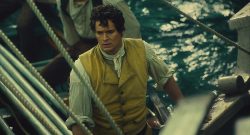 QUESTION: You still haven’t read it.
QUESTION: You still haven’t read it.
CHRIS HEMSWORTH: No. I mean, yes [laughs].
RON HOWARD: For me, it was my junior year of high school, John Burroughs High School in Burbank. When I went back and read it again, as I began research for In the Heart of the Sea, I realized that he’d gone easy on us, and I’d read the abridged version. The unabridged was even more useful for me because the stuff that they kind of leave out for anxious high schoolers is a lot of the whaling material and the detail.
The interesting thing that you also find out – and I wanted to reflect this to a degree in the scenes between Ben Whishaw and Brendan Gleeson – that Melville struggled with the book. He knew about the attack. He wanted to recount some of his own whaling experiences and so forth, and he wrote this book. And people – Nathaniel Hawthorne among them, apparently – said, ‘Boy, it’s pretty thin, pretty weak,’ and practically sent him to bed. He was a psychologically intense, somewhat troubled guy, and he went back, reviewed what he knew about the Essex, read a lot of Shakespeare, and invented Ahab. And I think the idea of the man versus nature – that compulsion, that drive, that modern, psychological component – seemed to come in later. So I thought it was sort of interesting to try to parallel, in a way, the journey of Melville and senior Nickerson, in terms of having the courage to come to terms with the truth about oneself and make acknowledgments that are painful. I tried to make that evening its own kind of psychological gauntlet that was certainly not as intense as what the crew of the Essex went through, but there were some interesting dramatic parallels and some insight into the creative process, maybe.
QUESTION: Ben, did you read it?
BENJAMIN WALKER: I read the Cliff’s Notes in high school. Aced the test. But I got the same stack of books, and I was looking at Moby-Dick, or Why Read Moby-Dick? And I read Why Read Moby-Dick?
NATHANIEL PHILBRICK: It’s a lot shorter.
BENJAMIN WALKER: It motivated me to read Moby-Dick, and I wish I’d read it in high school, I have to say. I would have learned a lot, and it probably would have kept me out of some trouble, because it takes forever.
CHARLES LEAVITT: Hampton Township High School, junior year – also outside of Pittsburgh. I had an English teacher named Mr. King, who regarded Moby-Dick as the Bible, and we spent almost the entire year parsing it.
QUESTION: That’s how long it takes.
CHARLES LEAVITT: At first – it’s true – it was like torture for me. But then, eventually, I sort of understood what my English teacher was trying to get at, and the importance of the book. So it kind of entered my DNA at age 16, and I really did not read it again until many decades later, when I was given the chance to adapt this book.
QUESTION: Tom, Chris’s character has a mentor/mentee relationship with your character, Thomas Nickerson. Did you have any kind of mentor/mentee relationships with the other actors on set?
TOM HOLLAND: I think the lucky thing for me is that, my character, Thomas Nickerson, is completely in awe of Owen Chase. When you first meet Chase, He’s this big guy. He’s fearless, brave, and Thomas Nickerson’s this little kid who’s completely wide-eyed and new to this world. And when I walked onto Ron’s set, I was the new kid. I’d never been on a film this big and I was completely in awe of Chris for the first, like, two weeks, so there was no acting required. I then realized that he’s just a big kid, and he’s really good. Working with Chris was great, and working with everyone was great, really. It was a really great experience, and you always learn a lot from a job like this because you’re so invested and involved with the film. So there’s a lot that I took away from this experience.








